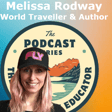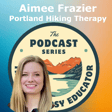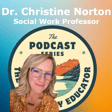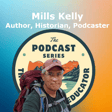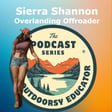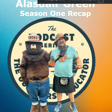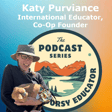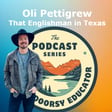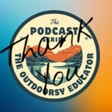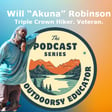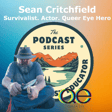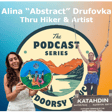Become a Creator today!Start creating today - Share your story with the world!
Start for free
00:00:00
00:00:01

Sydney Robinett
Sydney is a globe trekking educator with a passion for immersing herself into the communities where she lives. Despite personal setbacks, she continues to explore the world through the lens of teaching, and bring a unique perspective that will inspire all who listen.
Recommended
Transcript
Introduction to 'The Outdoorsy Educator'
00:00:02
Speaker
Welcome to the Outdoorsy Educator podcast, the show where curiosity meets the open road. I'm your host Alistair and I invite you to join me as we explore the world through travel, adventure, nature and the power of learning. Each episode we dive into inspiring stories from adventurers, educators and global citizens.
00:00:24
Speaker
Whether it's in a classroom, on a local trail, or adventuring halfway across the world, there are stories to be told and lessons to share. So pack your curiosity, lace up your boots, and let's discover how the world can teach us all one step, one story, one adventure at a time.
Global Teaching Journey of Sydney Robinette
00:00:45
Speaker
Sydney Robinette, born and raised in Texas, is an educator with a unique global perspective for teaching and a heart for service. With over six years of teaching experience, she has lived and taught in five countries, including China, Estonia, and now Peru, gaining a deep appreciation for the importance of immersing yourself in diverse cultures and communities.
00:01:08
Speaker
an avid reader and painter of the outdoors. Sydney's passions are not limited to the classroom, but everything is fueled by her passion for community service and lifelong learning.
00:01:24
Speaker
Well, on this week's episode, we have a wonderful globe trekking teacher, Sydney. Sydney, thank you so much for being here. How are you today? Thank you so much for having me. I'm excited, a little nervous, but I'm ready to get into the the thick of things.
00:01:40
Speaker
Awesome. As am I. By the end of this, I think all the nerves will have gone. Everything is going to be absolutely fine. Promise you. But why don't you start off? Tell us a little bit about yourself. Who are you?
00:01:52
Speaker
Tell us about your career a little bit. Where are you now? Things like that. Well, hello, my name is Sydney Robinette. I am an international school teacher. i actually started my journey off with mr Green here.
00:02:04
Speaker
And ah um from there, have worked in international schools in China, in Lithuania. I lived in Germany for a bit, studying migration policy in the EU. And then now I'm living in Peru.
00:02:19
Speaker
So I have been just going with the flow of things. I've had a variety of big events that have taken place in my life to get me to where I am now. And I'm sure we'll talk a little bit more about that later.
00:02:34
Speaker
um But I think at this stage in my life, I'm really just trying to be present, be grateful for the lifestyle that I have be and See where life takes me.
00:02:48
Speaker
There you go. love that I love that. So my assumption is, you know, you got into teaching and it's was, was the idea always to travel and teach internationally or did that kind of come once you'd become ah teacher and you thought, what am I going to do?
00:03:05
Speaker
Or was it always kind of the plan to, to globe trek as you were teaching?
00:03:11
Speaker
This is a question I've actually received a lot in my past. I think I've always had an innate curiosity and I always find myself wanting to try new things, to read and explore.
00:03:24
Speaker
So I think I've always had the trouble bug within me. But when and I began teaching, I actually had to ask several people in my university program, as well as friends of friends, for how I can teach abroad, but not simply just teach English.
00:03:40
Speaker
um And like I mentioned with my background in Germany, I have a strong interest in helping immigrant and refugee populations. So I was trying to do something that allowed me to be globally impactful or allow me to travel.
00:03:59
Speaker
And it just seemed like everything fell into place with teaching. um So i'm I'm really grateful for that. Shout out to... Searchassociates.com because that is really what got me, um I would say, more prepared for how to move abroad and what to expect and what schools can offer that is beyond just teaching English.
00:04:26
Speaker
Right, because that's probably the assumption people have. Certainly one I would to have is, oh, Sydney's off to teach in China. You're probably teaching English. And of course, that's a wonderful thing. But it just sounds to me like you wanted to go several levels deeper than just teaching basic English and moving on.
00:04:45
Speaker
Yes, I wanted to be able to use the skills that I was learning from my university and all subjects. um But also see if there was a way that I could find not just a program, but a school that was, I guess, more encompassing. um But, you know, teaching English abroad, I want to make it clear that it is still a very hard job.
00:05:09
Speaker
and Oh, yeah. I know many people are interested in that because it works with their schedules, but I wanted to see how I could combine my educational experience with my love for learning, plus um seeing how different education systems around the world also um respond differently to learners and meet their needs.
00:05:29
Speaker
so That's wonderful. I've got so many questions. I'm just trying to put them in some kind of cohesive order because I know I could just start firing questions. But I think going kind of chronologically to begin with would be a great thing.
00:05:43
Speaker
So you're based in the States. Obviously, you and I met when you were a student teacher across the hall from me here in Texas. um you You did that. You got qualified. And then was China was your first stop. Is that correct?
00:05:56
Speaker
Yes, it was. I arrived six months before the pandemic.
Teaching and Living in China
00:06:00
Speaker
So that in of itself was a very interesting experience, but I'm actually very grateful for it. I spent all three years there um and it really built up my confidence in how to approach and navigate situations that were very different, um as well as get me more confident in being able to solo travel as I...
00:06:22
Speaker
um for most of my teaching abroad experience has been um've done solo as well. Right, and China always feels a very interesting topic because I don't know if there's a ah country in the world that people's opinions differ on from those who have not been and to those who have been.
00:06:41
Speaker
yeah um i know ah i know a couple of teachers who have either been to China or worked and taught in China, and it's a wonderful thing to see how their opinion of China, the Chinese people, they is is so vastly different once they come back.
00:06:56
Speaker
ah what were What were your thoughts going into it? And then what did you discover while you were there? And of course, you were there during the pandemic. So that's ah that's ah and another thing entirely that I'd love to hear about. But what were we I'm sure you had some natural concerns going somewhere vastly different than where you're from ah for your first stop. So are some...
00:07:17
Speaker
nervousness is that for you're just traveling I'd love to hear how that what you did feel beforehand or were you just excited and then what what was your opinion after you were there for say six months or a year how did things change for you Well, so beginning my journey, I, like I mentioned before, I really was curious about the world. I have been watching National Geographic religiously. i read a lot of books on history and um I really love to follow different Pinterest boards of places to see
00:07:54
Speaker
um For me, it's beyond tourist attractions. It's how like people's lives can be so different and yet so similar to mine. So when i had finally heard of how I could get into this market and that I was finally qualified,
00:08:10
Speaker
um I had been chatting with someone on Facebook Messenger. It was like a friend of a friend who had moved to China like 10 years ago. And they were like, oh, we'll just put you in contact, see um how y'all connect with each other, as they're interested and all.
00:08:27
Speaker
And I remember working in Texas and just thinking like, you know, I really like this, but I have so many loans that i just got hit with. um i was going to pay for university all by myself. And I didn't understand the loan system when I had taken out loans um while I was living a there. So me and my family were all actually kind of stressed out because we were trying to manage everything.
00:08:53
Speaker
our family finances and then me not only contributing to that but also how to um manage my loans itself after that you know I had this situation where I was notified that I would be not able to join the following year at the school that I was working at and it was like within 48 to 72 hours, I got a message from the individual in China that said, hey, we've been following you on LinkedIn.
00:09:28
Speaker
They had no idea that I had just not been renewed a contract, but they said, we have a position that was exactly what i was teaching for fifth grade. um that's great And they said, if you were interested, we can do an interview and either today or tomorrow.
00:09:47
Speaker
So I accepted the interview, not telling really anyone um what was going on. And when I got it, The interview went really well.
00:09:58
Speaker
And um because me and that individual had been talking back and forth for so long, we I just felt very calm and kind of similar to what I had told you before we started the podcast of um being able to follow your gut when things feel peaceful, like if it feels like a sigh of relief, then to move forward with it.
00:10:20
Speaker
That is something that my mother has taught me growing up. And that is just what it felt like. It just felt like everything was falling into place. So um
00:10:32
Speaker
I think it was just more of like a ah calling to do what I was meant to do. Yeah, I can completely relate. And I just realized that you know something that I just said was probably slightly out of line. You might not have been nervous. You might not have had any trepidation.
00:10:50
Speaker
Some people would, but I'm excited to find out as we get into this more and more of your feelings as you've gone from country to country. Now, did they sort of handle the the work visa? Because imagine there's some serious paperwork that goes into all of this.
00:11:06
Speaker
Yes, China. they help you handle that, kind walk you through that? which China had some very intense visa processing and the school was able to cover it. I would say most of the international schools, not most, every single international school that I've worked at, they have um part of that as your like settling in package where you get and upfront um cash amount when you arrive that allows you to purchase things for your apartment and then it also gives you a reimbursal for whatever you needed for the visa process.
00:11:39
Speaker
So it can be complicated, but that's why for me finding a school that and has the resources to be able to provide that as well as like a very regimented idea of the legal system is very important. um Absolutely.
00:11:58
Speaker
Yeah, because there' hard there are some teachers that come on for for an international school or for English programs, bilingual schools, but they arrive and there's so many missing parts to their visa that they actually have more complications and they're you know, they're put on a special list and it becomes very hard for them to leave the country, for example, or maybe they can't like get their work visa. So they're technically not doing things properly. And it's just it's not worth the risk.
00:12:32
Speaker
So being able to like find a school that is able to take care of you is so, so important. Yeah, I imagine that's the last thing you want is to get into paperwork headaches, especially once you're there.
00:12:46
Speaker
That sounds like the last thing. So I'm so glad that they were able to take care of you. And how long were you there before the pandemic hit? I was there about six months. um Yes, the the pandemic, I was actually in Shanghai about 48 hours or so before they shut the city down.
00:13:09
Speaker
and they ended up shutting down the rest of the country. um That in of itself, I love love China. I would love to go back. But I think the China that I know, those three years that I was there, is very different than, let's say, the China that is now.
00:13:27
Speaker
um There was a lot of policy changes. And of course, um backlash between foreigners and locals based on how the pandemic was being handled, both internally in the country and then people that were being brought back in or people that were leaving. There was a mass exodus of of expats. So I think the political situation was a little difficult. But at the same time, that first year um of the pandemic was actually very peaceful in China because
00:14:03
Speaker
even though the country was shut down, you still were able to travel a lot within the country itself. um You just had to jump through a few hoops to make sure that, you know, you're not ah spreading anything, you're not contagious.
00:14:17
Speaker
And I think they really took care of their population in that aspect. um It had to be strict with the amount of people that um living there Yeah, I think, you know, in my limited research about the pandemic, it seemed to, in some ways, bring out the best in people and communities and then also bring out the worst in some regards.
00:14:39
Speaker
and Maybe that was out of fear, yeah you know lack of knowledge. We were all learning and kind of, but you know, building the plane as we're flying it kind of thing during the pandemic, especially in education.
00:14:52
Speaker
um So what did you see in terms of positivity in the pandemic? Like here we did see, know, certainly neighbors coming together, you know, and if somebody had something that another one needed, there was a lot of dropping things off on the porch and, right you know, but then also fear can bring out the worst in people.
00:15:12
Speaker
um what what did you see so during the pandemic as an expat? You would have quite not unique view, but certainly one that would be ah different to many people.
00:15:24
Speaker
um I could approach this answer in a multifaceted way. So on one hand, when it comes to, let's say, when you first view someone on the street,
00:15:37
Speaker
um Ethnically, i am Filipino, but a lot of people would assume that I'm either Chinese or mixed. So a lot of the locals would treat me very different compared to a lot of my co-workers um who were not Asian.
00:15:55
Speaker
And... in the negative aspect, um it would be a very large difference in the way that my coworkers were treated compared to me.
00:16:07
Speaker
um But of course, once I opened my mouth and they realized that I do not speak any Mandarin, you know, I would be kind of like lumped together. And for me, this was an interesting dynamic because pre-pandemic,
00:16:23
Speaker
I would see how my coworkers that were not Asian looking were treated and you know they were like celebrities. People would want to hand them their babies, take pictures with them, they wanted to touch their skin. um It was a kind of revolutionary concept based on where I was staying.
00:16:41
Speaker
um But to see that like progressively change and also being mindful of even sharing like where you are from because of the geopolitical situation. You know, we have the American State Department saying, oh, China's doing this. And then you have Chinese news that you can translate um saying this about Americans. So, you know, being mindful of your presenting identity and then your actual identity was something to balance.
00:17:12
Speaker
um But the positive aspect is that I feel like I have formed very lifelong and strong relationships with the people that had to stay during that time, both that were locals and both that were expats because we genuinely needed each other to be able to get through um the challenges of the multiple requirements that was needed every day, um whether it be like daily COVID testing or people coming to your house to taking pictures, or maybe, um for example, we had several co-workers who were out of the country, but, you know, they had pets that needed to be taken care of or an apartment that had to be cared for while they were away.
00:18:01
Speaker
And just really trying to be there for each other when um We couldn't be close with our families. like It was very hard to even purchase a ticket to leave. like You can't just get on a plane and go. You had to take steps to even enter the airport or to even get into a hospital to get tested as a foreigner. So there was... It was tough, but also it built community. so Right, right. Yeah.
00:18:28
Speaker
i love I love China, though. I think it's definitely one of my favorite countries I've ever visited. so um Yeah, so many positive things as well. Yeah, it's you know I think most of us, if we could snap our fingers and eradicate the the pandemic from history like it didn't happen, we would.
00:18:49
Speaker
But i there's got to be, there is, there's so many lessons learned during those tough times that we can all carry forward, and especially you being in a foreign country. very different to life here.
00:19:01
Speaker
So many lessons you must have carried forward to different situations in your life. And it must have changed how you handled those situations. Yes. Yes. Yes, very much. I would imagine you sort of go, well, actually, this might have seemed like a big deal, but look at what I've already come through.
00:19:19
Speaker
I can handle this. um Yes. I would imagine. Yes, it does make um handling... maybe more stressful or sudden situations be something that I can take in stride.
00:19:34
Speaker
um I definitely think it's built my confidence and patience. So it was a good learning experience. Fantastic. And we'll come back to China in a bit, but you left there and did you go straight to Lithuania? Did you come back to the States to sort of reset?
00:19:49
Speaker
What was the next step of this international journey? Yes, so I had been looking in either teaching in Japan and Korea or in just moving to Europe. A dream of mine would be to live in, bless you, in Italia or Spain.
00:20:08
Speaker
So I was looking in that general direction, but a lot of the packages that schools offer, again, on Search Associates, um they were more encompassing with healthcare care and with...
00:20:20
Speaker
um
00:20:24
Speaker
Housing, for example, in in Europe, if you are looking in that market um as you pretty much know as a teacher, the schools will offer you maybe a manageable salary to get by, but you really would be paying paycheck to paycheck or they would not offer housing at all or insurance at all. You have to do that out of pocket. So I was trying to find something as inclusive as China was because wow, wow like um I was able to pay off all of my loans.
00:20:56
Speaker
after living in China for those three years. So. Fantastic. Yes, it was. It was genuinely, it was like a weight off my chest. um So i applied all around Europe. I got a few offers, but decided on Lithuania.
00:21:15
Speaker
And that is my home away from home. I miss it genuinely. I miss it so much. um It was a traumatic ending and I hope to go back one day um and say hi to everyone.
00:21:32
Speaker
Right. yeah And how long were you in Lithuania for? I was there about two years. About two years. Okay, so and plenty of time to truly immerse yourself in the culture. and And it's one of those places that is not on the most people's sort of tourist map.
00:21:50
Speaker
ah But it should. It really, Lithuania is a gem. It is. It is small, but so full of nature. i absolutely love the people. They are so down to earth and um they're very humble. They're very straightforward and they're hardworking. um i genuinely feel a lot of the Lithuanian friends that I have made are probably some of the most loyal people that I've made. You do have to work towards um a relationship and a friendship with them, but I
00:22:22
Speaker
the the time that you do spend on cultivating these relationships are so worth it because i feel like I have been able to develop um very strong foundations but with my friends there. And um there genuinely is just so much to do and their love for the outdoors, for their history, for especially a lot of their old traditional practices are still being played out today.
00:22:53
Speaker
and it's beautiful to see how they can live harmoniously with them. Right. I love that. And and one of the the first things I think of, if you're going from the States, geographically a very large country, as diverse it is, to China, again, geographically another enormous country, then to Lithuania, which is a tiny bit country.
00:23:17
Speaker
So you're the rest of Europe, and well especially Eastern Europe, is so accessible. um It must have been a great opportunity to see see many different things while you were there.
00:23:30
Speaker
Absolutely. And I remember thinking, like my first two weeks there, I was kind of freaked out because I was like, where is everyone? And people are like, oh, there's so much traffic. And, you know, oh they're so busy today. And I'm looking around and I'm like, maybe I'm used to, you know, like people really being in in my bubble after living in China. And You know, just the noise and the crowds. But coming to Lithuania, was like, oh, it's so peaceful. It's so quiet. And um their capital, Vilnius, isn't the only place that I recommend people to see. But, wow like, it is absolutely gorgeous. I think it has the most churches in Europe.
00:24:13
Speaker
Really? Right? Yes. But you definitely get the mix of churches.
00:24:21
Speaker
post-Soviet buildings, plus these grand architecture, plus, you know, this like modern landscape, um all while being maybe a 15, 20 minute walk from the forest.
00:24:32
Speaker
So I really loved it. had everything in one. It's my forever home. I love it. um So in the, I think it was the mid nineties, maybe in the late nineties, I don't know if you've ever heard of Michael Palin, um quite a famous British travel.
Exploring Lithuania and Eastern Europe
00:24:48
Speaker
He was in Monty Python, this is where broke into the, and but then started doing travel shows in the mid eighties.
00:24:55
Speaker
um i won't bore everyone with the the whole story of michael palin but the bbc asked him to do around the world in 80 days like phileas fogg you know no planes can it be done and that really he really broke into the travel television world at that point and it's done easily half a dozen, maybe 10 different travel series over the years.
00:25:15
Speaker
But one of my favorite is he traveled um all through Eastern Europe in the late 90s after the Soviet Union had broken up and all these new countries. And he did ah he wrote a book and there was a TV series called New Europe.
00:25:27
Speaker
And since reading that 25, maybe even 30 years ago, I've always had this this desire to take a trip down through Eastern Europe. I've done Western Europe, lots of it, not all of it.
00:25:40
Speaker
but I think it would be at every travel show i watch that bases itself in Lithuania, in Poland, in Slovakia, wherever it may be, it's just fascinating.
00:25:51
Speaker
yeah um So I'm glad to hear that you had, it sounds like it was everything you hoped it would be and more. Yes, i i the only thing I would take away if I could is I didn't mind the cold. That was a completely new experience for me. That that truly was cold, cold.
00:26:10
Speaker
But I would say i to prepare myself more for how dark is. um it can get because it's so up north. I was not prepared, you know, coming from Texas.
00:26:22
Speaker
And even in China, in Qingdao, it was a beautiful coastal city. Sometimes it would be gray because ah the plow the clouds and pollution might be trapped by the mountains.
00:26:35
Speaker
But this was like dark at 3 p.m. We might have an average of, you know, four hours of daylight for the month. um That was hard mentally, but when it was summertime, spring, it was incredibly beautiful um and just light, like all day.
00:26:56
Speaker
it's It's very interesting, of course, when I have friends or anyone who's been to Scotland and I have conversations fairly frequently with people, oh you're from Scotland, I've been to Scotland. The one thing that people generally don't account for and surprises them is if they go in the summer, it's still light at 10 o'clock at night and the sun is up at 4.30, 5 o'clock in the morning.
00:27:17
Speaker
But if you go in December, like you said, it's dark at 4.30 and the sun's not up until much later in the morning. And a it really can have a an effect on your your your personality. But is it seasonal affective disorder? Like it's a real thing.
00:27:35
Speaker
Yes. It can truly affect how you act, what you do, your outlook um on life, during especially during the winter months. Absolutely. And I knew we had some co-workers who would recommend what is it called? A sunlamp.
00:27:55
Speaker
right would I would religiously sit down during breakfast to sit in front of that. And I feel like it did help a bit. But um the benefit of living in the Baltics is that hopping points to some brighter countries were fairly cheap and easy to get to.
00:28:15
Speaker
So that would be my way of being able to get that vitamin D back into my system. Yeah. And if, I mean, I could sit and talk to you about this for hours, but if you could choose one place that you went to that truly helped you, is out of reset is the right one, but truly get the sun that you needed, where would that one place have been that you took a little, say, a weekend break to from Lithuania?
00:28:38
Speaker
Boom. Boom. I hate to pigeonhole you and ask one. Give us a couple. Give us a couple. I would say... i wouldn't i don't know if any of these would be considered a ah weekend trip. I think weekend trip would have to be something definitely closer.
00:28:54
Speaker
But going to Valencia, going to Nice in France... um Split in Croatia. All of those were such beautiful scenery, amazing food, warm people, um of course, sunny weather.
00:29:13
Speaker
And I think those really recharged my brain in a way that other countries didn't. um But i still, i was able to travel a lot thanks to living in Vilnius. It was affordable enough that I could save um and travel on my teaching salary. So I feel very grateful for that.
00:29:35
Speaker
I love that. I think it's fantastic. um I just spoke to a good friend of mine called Roland who will, that will be last week's episode by the time this one comes out. And he spoke, he's camping. ah It's about three weekends a month he goes camping.
00:29:51
Speaker
And we talked quite a bit about You know, just the connection to nature and how, you know, the last hundred years or so as ah the human race, we've gotten away from that.
00:30:02
Speaker
But we truly are meant to be in nature and feed ourselves through sunlight, through the forest, through that connection. And it sounds like even the hustle and bustle of teaching around the world and being in, ah you know being in Eastern Europe and teaching, you're still, you're seeking that a bit.
00:30:19
Speaker
Yes. And appreciating that reconnection. um So you were in Lithuania. How long were you there for? In Lithuania? Yes. About two years.
00:30:29
Speaker
About two years. And then, am I correct in saying you went to Germany to study? Yes. During one of my summer breaks, I had went to a university in Berlin.
00:30:40
Speaker
And the purpose of the class was to compare eu migration policy to American and a little bit of Canadian um migration policy. i was at the time going to a refugee slash migrant detention center in Lithuania.
00:31:02
Speaker
and And through word of mouth, I have been told that they have some fairly strict... camps compared to other countries just because of, I believe it's a strait that connects Lithuania to the rest of the EU. So they're very mindful of who can get in and get out.
00:31:22
Speaker
no So I just wanted to understand policies better, to understand the people that I was helping to volunteer with ah in Lithuania. um But I was only there about a month. I right was on the outskirts of Berlin.
00:31:39
Speaker
um i like Germany, but I don't know if Berlin was was the place for me. Right. and Again, it just must have been a fascinating experience.
00:31:50
Speaker
um I just imagine that kind of experience and immersing yourself in that. You must have left every day with you know Good feelings about things that are being done, probably some things that maybe angered you, things that you heard.
00:32:05
Speaker
um But what a wealth of knowledge to then take to other places and other communities. I think it would be fascinating. Did you go back to Lithuania from Germany before you um moved went to Peru? Is that correct?
00:32:20
Speaker
um So that was the summer in between my first and second year of Lithuania. Okay. um And then when I was in Lithuania, I had a medical emergency. Actually, it was why I had to leave.
00:32:35
Speaker
Right. i had got COVID. It wasn't my first time getting COVID. But two weeks after I had healed, I got the flu. um And it started off...
00:32:49
Speaker
Very simple. I guess like, you know, I had a pretty high fever, but it just wouldn't break. um And I remember like moving my bed onto the floor so I didn't have to move a lot in my apartment.
00:33:04
Speaker
um But then it got to the point where I was feeling so weak that all I could do is crawl around my apartment. And by that time I had taken so many days off. um I ended up calling boss and some coworkers and friends just to be like, Hey, I really think like I need some help. um And i ended up being hospitalized for two weeks.
00:33:27
Speaker
um And during that time, they basically said they don't understand why my body's reacting this way. Maybe I had a neurological reset. um i was,
00:33:40
Speaker
going through some other events mentally um during that time. So I guess it was just very stressful. And ah the combination of all three, i couldn't stand on my own. I couldn't walk on my own.
00:33:55
Speaker
um And what was two weeks ended up being me needing to be flown back to the U.S. with my family, um where I was then in a wheelchair for about six or seven months and not does me yeah, we learned how to walk for another two or three months. so I was in physical therapy, um, pretty much four days a week.
00:34:21
Speaker
And, um, It really was a life transforming experience. i I left my apartment the way it was. i you know i had friends pack it up and send me things for me.
00:34:34
Speaker
um My school was really gracious and understanding with you know me not being able to continue my year. um And even thinking about it now makes my heart break a little bit.
00:34:46
Speaker
But at the same time, I think all of my travels, especially with um my journey in China, kind of gave me the resilience and mindset to try continue pushing on.
00:34:58
Speaker
ah There wasn't really another option. um And from there, I got offered a position in Peru. the The school that I'm working at now actually reached out to me.
00:35:12
Speaker
when I was looking for jobs. um At that point, I was beginning to walk um more comfortably, more confidently, but I was actually not looking at teaching. I thought this was like, maybe this is a sign from the heavens that it's time for me to move on from teaching and go like strictly into um humanitarian work.
00:35:35
Speaker
I was applying to a bunch of um jobs for asylum seekers. I wasn't getting any hits, but I got this email from the school randomly and here I am in Peru.
00:35:50
Speaker
And without asking you obviously to divulge anything you don't want to, did you end up with some resolution as to what happened? No. Or it's just in the past now?
Health Challenges and New Beginnings in Peru
00:36:00
Speaker
I have seen so many specialists and doctors.
00:36:04
Speaker
um No one has been able to give me a diagnosis. and At the time, it was very frustrating because I needed like paperwork, I needed aid, i needed insurance, um especially when the insurance from Lithuania ended. That was really hard.
00:36:23
Speaker
And it was really tough to find specialists that I could afford and the US. um
00:36:34
Speaker
So, yes. Right. So it's just now, and but now you're doing well? like these it's For the most part, yes. There are still some days that i am feeling fatigued, and that is a lesson to teach me that I have to listen to my body, even if I want to do ah million things and my brain is going, you know, a mile, 100 miles per hour, um I really have learned my lesson of I need to just listen to my body and respect it first.
00:37:06
Speaker
So good advice for us all, I think. So you've now arrived in Peru. How long have you been there? What are you teaching? How long do you anticipate? You're in Lima. Is that right?
00:37:17
Speaker
Yes, I'm in Lima. I have been here about two months now um and my contract will be for two years. So I have enough time to explore South America, explore around Peru, but because of the medical requirements,
00:37:34
Speaker
incident i am really taking it slow with high altitude travels here um so i think exploring peru more will be have to i will wait i don't want to like write come too early you know so um it it was a really big deal for me to be able to have the capability to travel again um You know, it it's been a very tough year, a tough transition. My mom had cancer.
00:38:05
Speaker
<unk> sorry to hear that. So it really has been like a a one-two punch. But that is why for me going slow, seeing where things are and just enjoying the moment, being more present is is all I can live up to at the moment. And that's fine enough for me.
00:38:23
Speaker
Absolutely. Yes. Yes, and imagine, well, it obviously has going through traumatic event, if I can say that, does shift your perspective and you come out on the other side with a yeah renewed vision of what's important and how to care for your body and taking your time when you need to take time.
00:38:42
Speaker
Absolutely. so So it's good for you doing that. And then with regards to traveling and teaching, what do you think will be next? Do you have your eyes on a certain, another country? are you going to be ready to come back here?
00:38:54
Speaker
Or is it just an open book at this point? Right now it's an open book. I think the way this past year has played out, um it really, for so long, i have had to only think of like, do I have enough strength or mental fortitude to get through, you know, the next few hours or to get through the end of the day?
00:39:16
Speaker
And I think this mindset has kind of stuck with me of I'm just going to try my best and what happens will happen. um can dream of, you know, going here. would love to go back to Spain. would love to go to Italy. course. Pre-medical incident, I was very much like, this is my five-year plan. This is what I'm going to do in two years. I'm going to hit this benchmark. And if I don't,
00:39:41
Speaker
You know, I was really hard on myself. And right now I just I want to see Peru can be my home away from home and is something that I can settle in more. Or, you know, if not, then it just means there's more of the world to experience.
00:40:01
Speaker
I love it. What a great attitude. Something I would love to ask you, and if you're not comfortable asking answering, please just say, but you've obviously been, you know, you studied immigration patterns and being an immigrant yourself, being part of the expat community, the views on immigration in different countries, um how has that how has that changed from place to place, both people viewing you and then other people coming into their country? Have you noticed big differences in the different countries where you've worked?
00:40:35
Speaker
Yes and no. I think you we will always have either a very liberal or a very, um
00:40:46
Speaker
what would be the correct word? Right. Not liberal. right perspective on things. But I also think... For example, if I'm just thinking of the expat community, um when I first started out and something that really frustrated but me, it's something I actually just put as one of my tips on my TikTok, was that when you travel as an expat,
00:41:11
Speaker
I think it should be natural. it should be important that you not only, of course, learn some things of the local language or maybe a little bit of a historical background so you can understand like what topics to avoid or maybe questions to ask.
00:41:28
Speaker
um But I feel that it's very important to not place your expectations of conformity of that culture To you.
00:41:40
Speaker
Like you should be the one integrating. You should be the one going out of your way to understand and be open-minded. um And I felt that when I first started this lifestyle, there was many...
00:41:53
Speaker
individuals, many expats that did not have that mindset. They were like, these were expectations that I brought from, you know, my home and my privileges back in the country that I'm from. And I'm here to take advantage of ABC. And that never really sat right with me.
00:42:11
Speaker
um But I feel like the more that I have traveled and the more expats have that I've met, I guess there has been just a little bit of a shift in that mentality and they are more willing to be more open-minded and, you know, even being mindful of their physical or, um,
00:42:35
Speaker
body language when they're interacting with, with locals. I'm not a guru. Like I'm, I'm definitely, you know, I make my mistakes too. That's part of the traveling experience. yeah Um, but I think there is a little bit more respect that I'm seeing on the expat regard. Um, when it comes to locals and their view on migration, I think it's definitely based on country by country because of things like crime or um
00:43:07
Speaker
I would say that would just be the the biggest negative feedback you might hear from from a local. It's just like, oh, we are allowing multiple people to come here and there isn't really any resources for us to give them because we ourselves are also struggling.
00:43:28
Speaker
um Or it's... it's the opposite where, you know, you have all these expats moving into a ah part of the city and they're gentrifying it. And now locals like who,
00:43:41
Speaker
need the money to support their businesses, um it helps on that front, but then they can't afford to live there anymore. So it becomes a very complex system of give and take.
00:43:53
Speaker
And um I think that also plays into the part of your job as a as a tourist or as a traveler is like, how can we negate that impact as much as possible?
00:44:06
Speaker
Yeah. but But it's kind of hard. I recognize that I, for example, I'm an international school teacher and a lot of the populations that I've worked with are in higher socioeconomic classes.
00:44:22
Speaker
And for me, it's important to acknowledge my privilege because I recognize i can save money that I might be paid more than local staff or that the populations I help don't necessarily trickle down at times.
00:44:42
Speaker
And that's something that I have been trying to navigate in my teaching journey because I do want to be mindful of my impact on the local community as an expat. But not everyone thinks that way.
00:44:53
Speaker
like ah That was a long answer, but... No, it's an incredibly unfair question in a lot of ways because it's such a complex, complicated, you know, a complex issue um so i really do appreciate it because again you have a pretty unique insight into this um you know you you are on the ground even though you're working perhaps as you said in an international school with higher socioeconomic students it's an invaluable perspective um and a really interesting response so yeah thank you thank you for that um
00:45:28
Speaker
Now, I've got to ask you a question, because she just because I think
Future Plans and Personal Growth
00:45:31
Speaker
would be interesting. Have you ever thought about writing a book about all of this or some kind of guide? Because I imagine a lot of people, especially in education, but in other fields too, would kind of go, I'd love to do that, but I don't know how.
00:45:46
Speaker
Or i am I'm nervous about it. Or, you know, what about this, what about that? if you Have you ever thought about, maybe you have written a lot of this down um about your experiences?
00:45:58
Speaker
Um, so my bucket list does include writing a book and I would love to do that. Um, I do have this little, it's not a journal. It's more of like a spreadsheet. kind of tur And, um, I do like to ask very informal, very short interview questions from people that I meet of their life lessons that I've been holding onto.
00:46:24
Speaker
um, I just don't know how to put it all together, but I would love to do that. I would love to do more video based content. um But it's it's definitely like a so ah learned skill that I have not obtained yet.
00:46:40
Speaker
Absolutely. um A good friend of mine, of I remember him saying to me that every teacher has a book in them, whether it's a children's book or something else. And in my career recently, I've transitioned more and more into working with pre-service teachers.
00:46:55
Speaker
And I just imagine being able to present them with a guide or ah you know a book that you have written about qualifying as a teacher and then ah becoming a true global citizen with your educational qualifications and skills as the backbone for your travel.
00:47:13
Speaker
um So I'm going to highly encourage you to put these things in the right. It sounds like a great idea. Yeah, it's an amazing story. I've got this vision now in five or 10 years about handing people your book.
00:47:25
Speaker
and saying, yeah I knew her when. So no pressure. Well, we should talk more. We should figure out how to make that possible. No pressure. I think it'd be wonderful thing. would love that. A wonderful gift for new teachers to have.
00:47:36
Speaker
um So we'll discuss that. You've transitioned beautifully into the next stage of this podcast because I'd like to ask you ah three questions. And if you need to pause for a minute, please do.
00:47:48
Speaker
But um is there one piece of music or audio book that has been particularly, or or physical book that's been particularly impactful in your life, something that you can listen to over and over again or read over and over again and really has ah given you something profound?
00:48:07
Speaker
Yes, it is called Invisible Cities. I can't remember the author. um He's a classic Italian author. And it's basically about the story of Ganges Khan.
00:48:23
Speaker
And he has this person, I don't it's Marco Polo. I need to re-look that up. But basically, he sends them out exploring and he comes back every single chapter telling about a city.
00:48:38
Speaker
And at the end of the book, it basically shares that every single city that he described was the same city. And it makes you think of, it makes me think of how my perspective um influences the way I view my travels or country or people.
00:49:00
Speaker
So it's just a healthy reminder of the variety of ways that you can look at your reality and then how you're in. how your actions are um influenced by it. So it and doesn't like come across that deep. It's is very much like this city is like this. But when you really boil down to what happens at the end, you're like, oh, he's he's just describing one city, but from different points of view.
00:49:28
Speaker
And it's really beautiful. Yeah, i mean, one of my, perhaps the most impactful book of my life, I've got a couple. One of them in particular, A Walk in the Woods by Bill Bryson, is fairly surface level.
00:49:40
Speaker
There's a lot of funny moments. It's nothing too deep. But it it opened my eyes to a world I didn't know much about. And I read it 20 years ago and continues to be impactful to this day.
00:49:53
Speaker
So, you know sometimes it's really shallow stuff, sometimes super deep stuff that really just speaks to us. So, I mean, I'm going to look up Invisible Cities when we get off this call. And I think that would be fascinating to read.
00:50:06
Speaker
um My second question for you, how do you handle moments of self-doubt or uncertainty? Yeah.
00:50:19
Speaker
I think the, I don't think there's an answer to that simply because for me, it seems to be an evolving journey. And actually the past two days has been really mentally difficult for me.
00:50:34
Speaker
i feel, um a little overworked at the moment and I feel like I haven't really been showing up for myself. And, um,
00:50:47
Speaker
Sometimes it's just waiting it out. Sometimes it's reminding myself, like sometimes I'll create lists of like, oh, these are the things that I've accomplished that maybe in the moment I didn't really pay attention to how big of a deal that is and look how far you've come.
00:51:03
Speaker
um It could be listening to a motivating podcast or, you know, going to the gym, getting those, getting the endorphins out might be the wrong word, but cooking myself some some good food.
00:51:19
Speaker
um Yeah, just really taking time to show up for myself is the closest answer. my book you No, no, perfect. And I'm very aware, I'm just throwing questions at you that you might have an immediate answer for, and then other times you might, and that's perfect.
00:51:34
Speaker
But my last one for you, what does success mean to you? What does it look like to you? And how do you think what you view as success might have evolved over the years?
00:51:46
Speaker
Okay. Hard-hitting questions. That's right. it's the last It's the last one of these spontaneous ones, I promise.
00:51:56
Speaker
So pre-medical incident, I like to, i guess, view my life in chapters. Yeah. Pre-medical incident, I was a big planner.
00:52:07
Speaker
and success looked like to me, one, paying off student loans, because it really was a lot. I had no idea what I was doing. And it means I did my family and...
00:52:18
Speaker
um there really wasn't gonna be a way that I was gonna be able to balance paying that off on top of um you know, even like getting an apartment for my for my own. So being able to work abroad has given me that financial freedom. um But success also looks like just being able, for me at that time, to be able to speak more confidently and advocate for myself.
00:52:46
Speaker
I felt like I was a very, passive person. Um, and I, I don't think I had a lot of confidence. Um,
00:52:58
Speaker
Even with all my traveling, you know, it like it gave me skills to feel confident. It gave me ah the ability to be more perceptive of my surroundings. But in regards to being perceptive of myself and what I want and like what I truly want and not being scared to ask for that, I think was something I was still very like holding off on. Yeah.
00:53:25
Speaker
Post-medical. Success to me, I think just boils down to how can you allow yourself to feel like a kid again?
00:53:38
Speaker
And how are you contributing to make other people feel the same in a positive way? I love that. Yeah, these are not easy life lessons for any of us to learn whatever stage of life we're in.
00:53:54
Speaker
um So I absolutely love that. Now, if people would like to find you online, follow your journey, perhaps ask you a question, where can people find you? um My Instagram, TikTok, and YouTube are all under womanverse travels, womanverse underscore travels.
00:54:15
Speaker
I just bought a new camera, so hopefully i can make longer formatted videos. I'm really having fun playing with like all the edits. um Yeah, we we at both Sydney and I ended up buying the exact same camera a couple of months apart.
00:54:29
Speaker
So I'm quite excited to learn alongside you. Yes, there's a lot to learn. It's a complicated little machine, but I think it's incredible. I've you know watched people on YouTube who are well-seasoned with it do wonderful things, and that's one of my goals this summer.
00:54:46
Speaker
um Sounds like it is for you too, is to really get to grips with this. Definitely, yes. Yeah, fantastic. Well, Sydney, I cannot thank you enough for giving up your time, especially it sounds like it's been a very busy season at work recently.
00:55:01
Speaker
So thank you so much for giving up, I mean, an hour of your time to do this. um It's been wonderful talking to you. Thank you very, very much indeed. Thank you. Thank you for having me and for thinking of me at all. I've always wanted to do ah podcast, so for it to happen in person is crazy. Absolutely. well I feel honored that we were your first podcast, and I've got a funny feeling you will be back. So thank you very, very much indeed. Thank you, Alistair.
00:55:31
Speaker
Thank you again to this week's guest and I hope today's episode was as enjoyable for you as it was for me and perhaps even inspired your next adventure. If you did enjoy the show, please be sure to subscribe, leave a review or follow us wherever you get your podcasts.
00:55:48
Speaker
You can find more information at theoutdoorsyeducator.com or follow us on Instagram, TikTok or Facebook. Until next time, thank you so much for listening to The Outdoorsy Educator Podcast.



